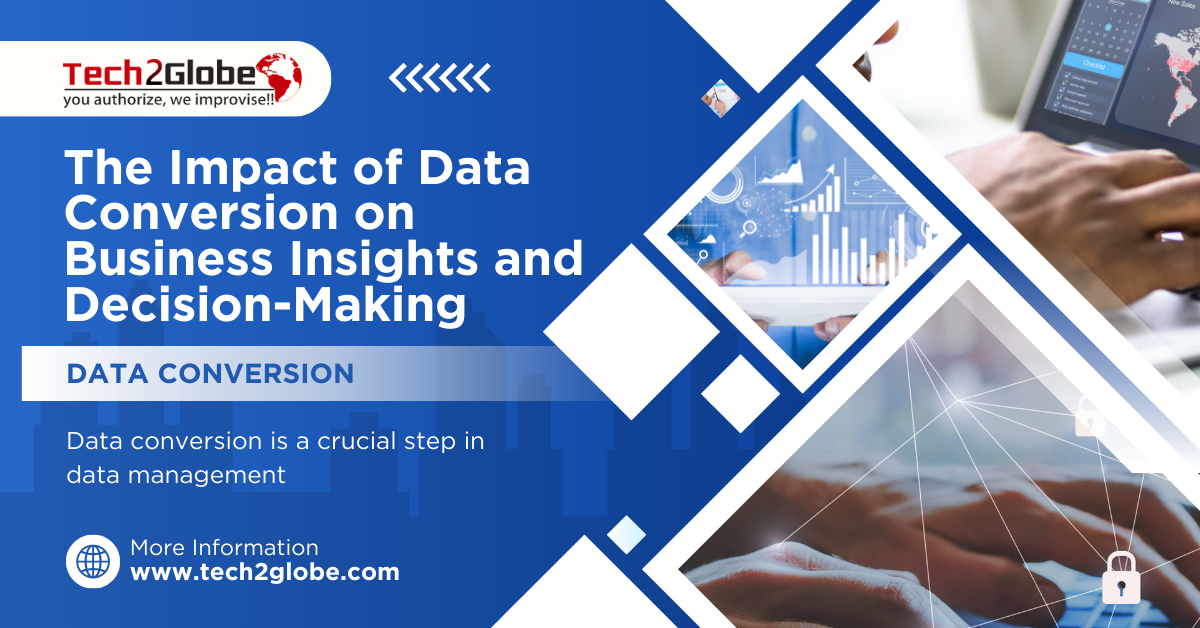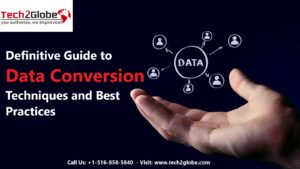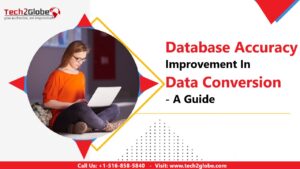Summary: Learn everything about data conversion and its role in helping you make the right decisions for business growth, along with tips to avoid mistakes in data transformation and more.
Data conversion is a crucial step in data management. It refers to converting data into another format compatible with various systems and applications. Conversion is more than just converting numbers or characters from one format to another; it also involves transforming data into a machine-readable format that can be read by software or hardware.
You may need to convert data from one format to another for several reasons, and the reasons for doing so vary based on the circumstances. Data is omnipresent in today’s digital world, but what use is it if we can’t use it to help our businesses? Data conversion can assist companies in consolidating data from several sources into a single repository.
Implementing the right reporting tools and accurately analyzing and measuring data can lead to decisions that drive your business forward, although this may seem like an incredible concept in theory. However, even if you have access to the world’s best data, making judgments based on intuition rather than tangible understanding is feasible. In most circumstances, this may be damaging to the business.
While it is occasionally acceptable to trust your intuition, most company decisions should be supported by razor-sharp metrics, facts, statistics, or insights connected to your objectives, goals, or projects that may provide a strong foundation for your management reports and business operations. Tech2Globe Web Solutions is your ally in navigating the complex realm of data, ensuring that your business not only survives but thrives.
Enhancing Decision-Making
Enhancing Decision-Making using data leads to achieving business objectives. Collecting, extracting, structuring, and analyzing insights for improved data-driven decision-making in business was formerly a massive undertaking that naturally slowed down the entire data decision-making process. The current development of business intelligence tools and democratization allows individuals who are not particularly technically savvy to analyze their data and draw conclusions.
As a result, less IT help is required to provide reports, trends, and visualizations that aid data decision-making. Different companies can accelerate the process with sophisticated data transformation software to ensure data is correct and organized.
Companies that recognize the benefits of data transformation software, especially its ability to efficiently convert data, are freed from the limitations of technical complexity.
Tips to Avoid Mistakes during Data Conversion
Here are some tips to avoid in data transformation or conversion process:
Conversion Requirements:
The initial stage in conversion of data is to carefully establish the requirements. Later on, determine the source and destination formats, data types, and data components to be transformed. This will allow you to create a clear plan for your conversion process and avoid mistakes later on.
Data Integrity:
We can’t avoid data integrity if the discussion is regarding data conversion as data integrity is critical during the process. Validate your data to guarantee its completeness, accuracy, and consistency. Perform data cleaning to eliminate any duplicate or missing information. This will help you prevent mistakes and guarantee that your data is of the highest quality.
Use of Data Mapping Tool:
A data mapping tool is required when translating data from one format to another. It aids in defining the relationship between the source and destination data items, data types, and data structures. This guarantees that the data is accurately transformed and prevents mistakes throughout the conversion process.
Normalizing Data:
Normalization is organizing your data in a structured format to reduce redundancy and enhance data quality. Normalized data is easier to manage, search, as well as retrieve. Ensure that your data is normalized before transforming it to a new format.
Testing Conversion Process:
Testing is a critical step in any conversion process. Test your conversion process to ensure it works correctly and the data is converted accurately. Identify any errors or issues and correct them before the final conversion.
Error Handling:
Error handling is essential during data transformation. A powerful error handling mechanism must be developed to detect, flag, and handle errors in turn. This will help in making the transition completed smoothly even if mistakes are made.
Use of Version Control:
Version control is essential when transforming data over time. It helps track changes to the data and ensures that the proper data version is utilized during the conversion process. This helps to prevent mistakes and ensures data integrity.
Monitoring the Conversion Process:
Monitor the conversion process closely to confirm it is running smoothly. Identify any issues or errors and fix them as soon as possible. This helps avoid slips and ensures the conversion process is completed successfully.
Our Tailored Solutions for Diverse Business Needs
Solutions that maximizes the data conversion’s potential analytics:
Standardization:
Data conversion helps to normalize data by translating it from many forms into a standard one that can be evaluated more readily. This process guarantees that the analyzed data is correct and consistent. It also removes the flaws (if any) that might bias the study results. Making data follow the same criteria allows us to compare information from various sources and identify trends that might otherwise go unnoticed.
Data Accessibility:
Conversion of data can make data more accessible by transforming it into a form easily analyzed using BI tools. When data is readily available, organizations can immediately analyze their performance, make more informed decisions, and modify fast to market changes.
Improved Efficiency:
Our database conversion services can improve the productivity of business intelligence tools by lowering the time and effort necessary to process data. In addition, organizations might save time and costs by transferring data from paper-based systems to digital forms. This decreases the possibility of mistakes and ensures that data is handled promptly and precisely.
Data Integration:
Database conversion can assist companies in consolidating data from several sources into a single repository. This gives firms a comprehensive perspective of their operations, consumer behavior, and industry trends. Organizations can detect trends and patterns that might go unnoticed if data were analyzed separately.
Data Security:
Last but not least is enhancing data security by converting data into a more secure format and making it less prone to data breaches. By employing data security firms, they, they can easily protect sensitive information against unwanted access and theft.
Conclusion
Now we know how crucial data conversion is, and we understand how turning data into valuable information can dramatically change a company’s learning and choices. It is not something to be taken lightly; It’s expensive. We know the marketplace is highly competitive; hence, an organization must have a clear and scalable strategy.
Don’t let your data remain unused. Our professionals are ready to take you on a journey into data literacy, where insights drive decisions and success is predictable.
Frequently Asked Questions (FAQs)
Q.1. How does data contribute to the decision-making process?
A.1. Data-driven decision-making relies on analyzing acquired data, utilizing a variety of data-collecting methods to answer questions and discover insights that may help inform judgments, assist in determining the appropriate course of action, and guide overall strategy.
Q.2. Why is conversion data important?
A.2. Converting data is done to prevent data loss or corruption by preserving its integrity and the structures inherent within it. Providing that the destination format supports the same features and data structures as the source data, this can be accomplished with relative ease.
Q.3. How do conversions increase corporate efficiency?
A.3. Utilizing conversion services allows organizations to swiftly access, analyze, and obtain insights from the data by combining data from several sources into a single format. This allows for the data to be processed more efficiently. The integration and accessibility of this system improve operational effectiveness and make it easier to make better decisions.










